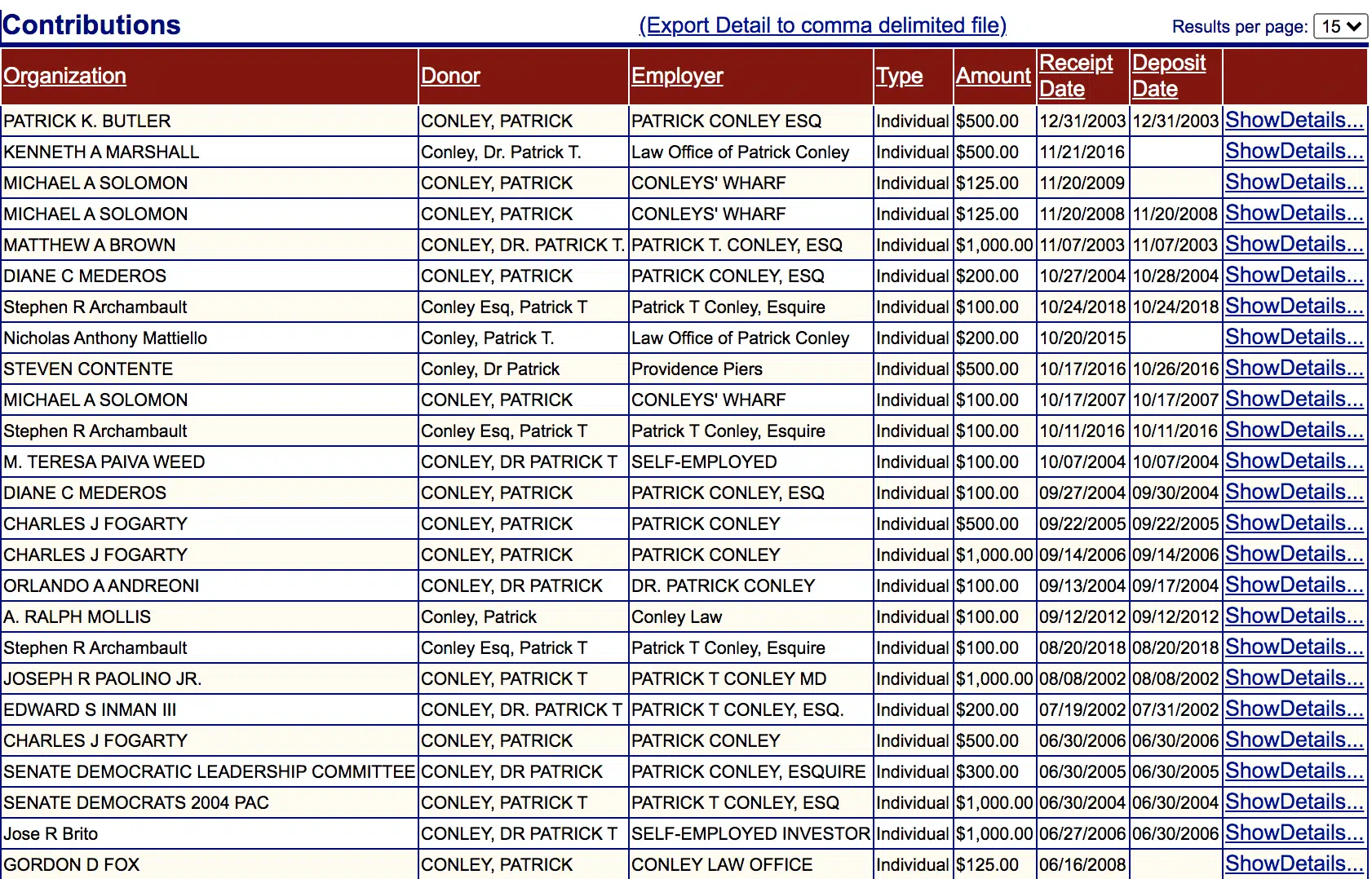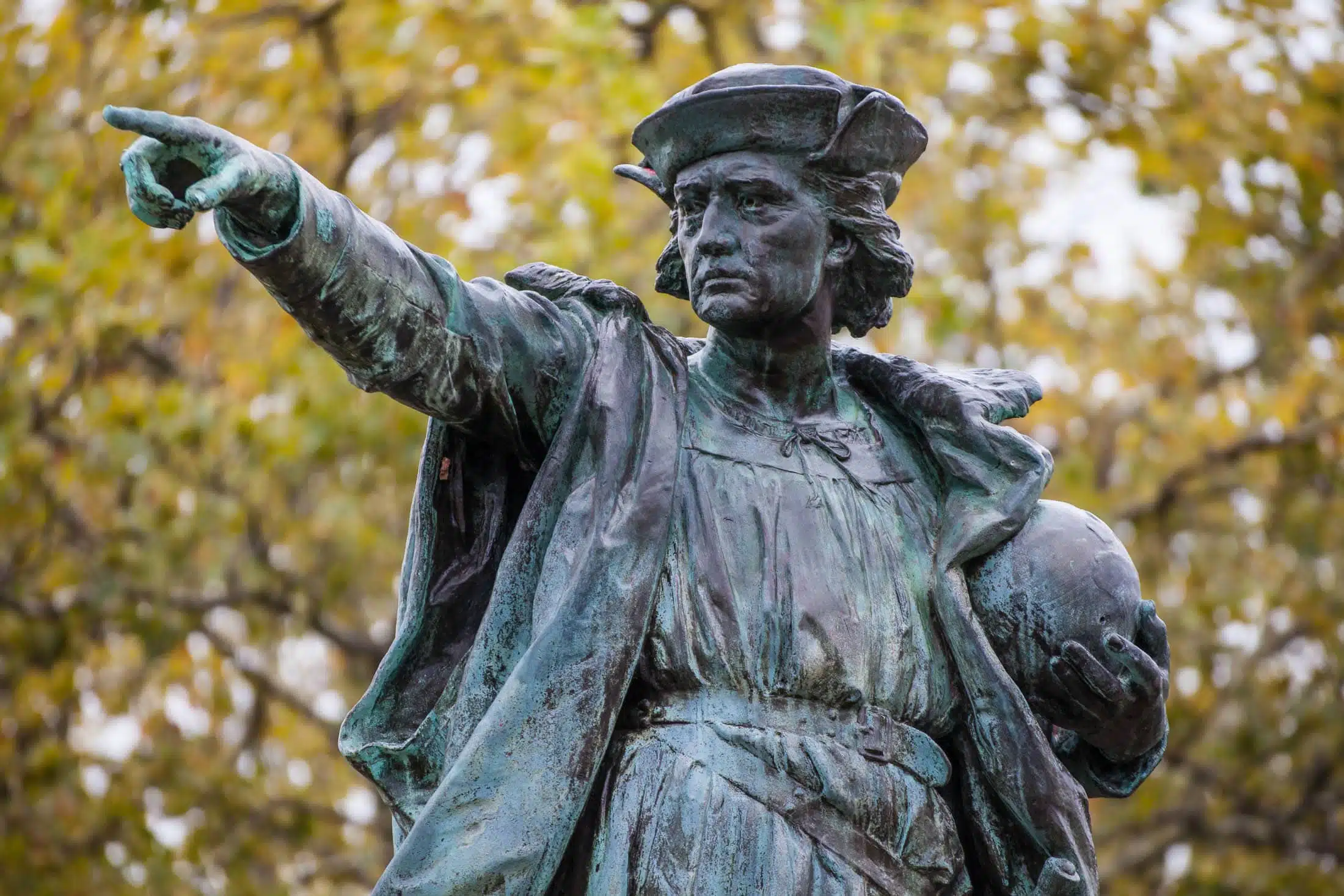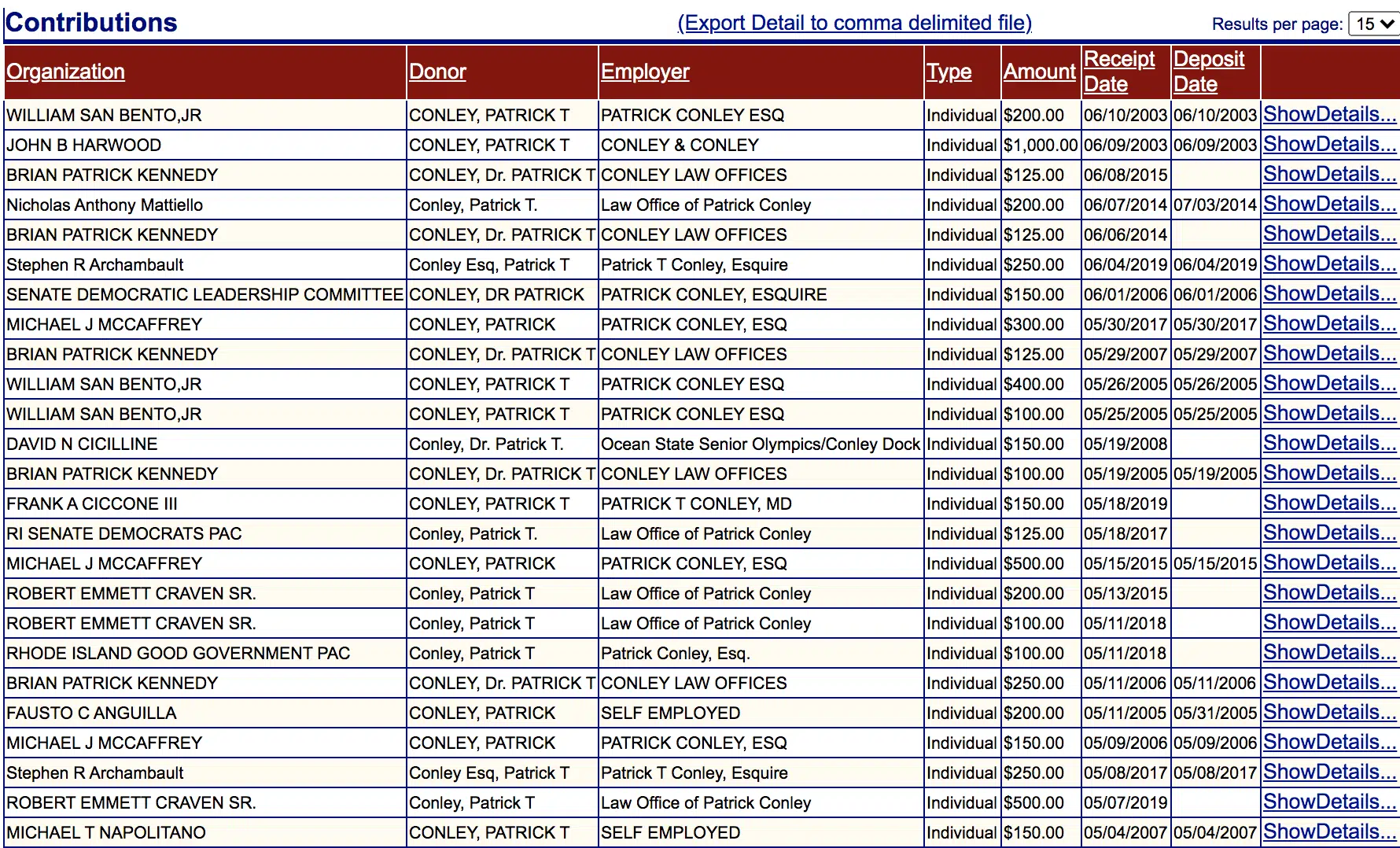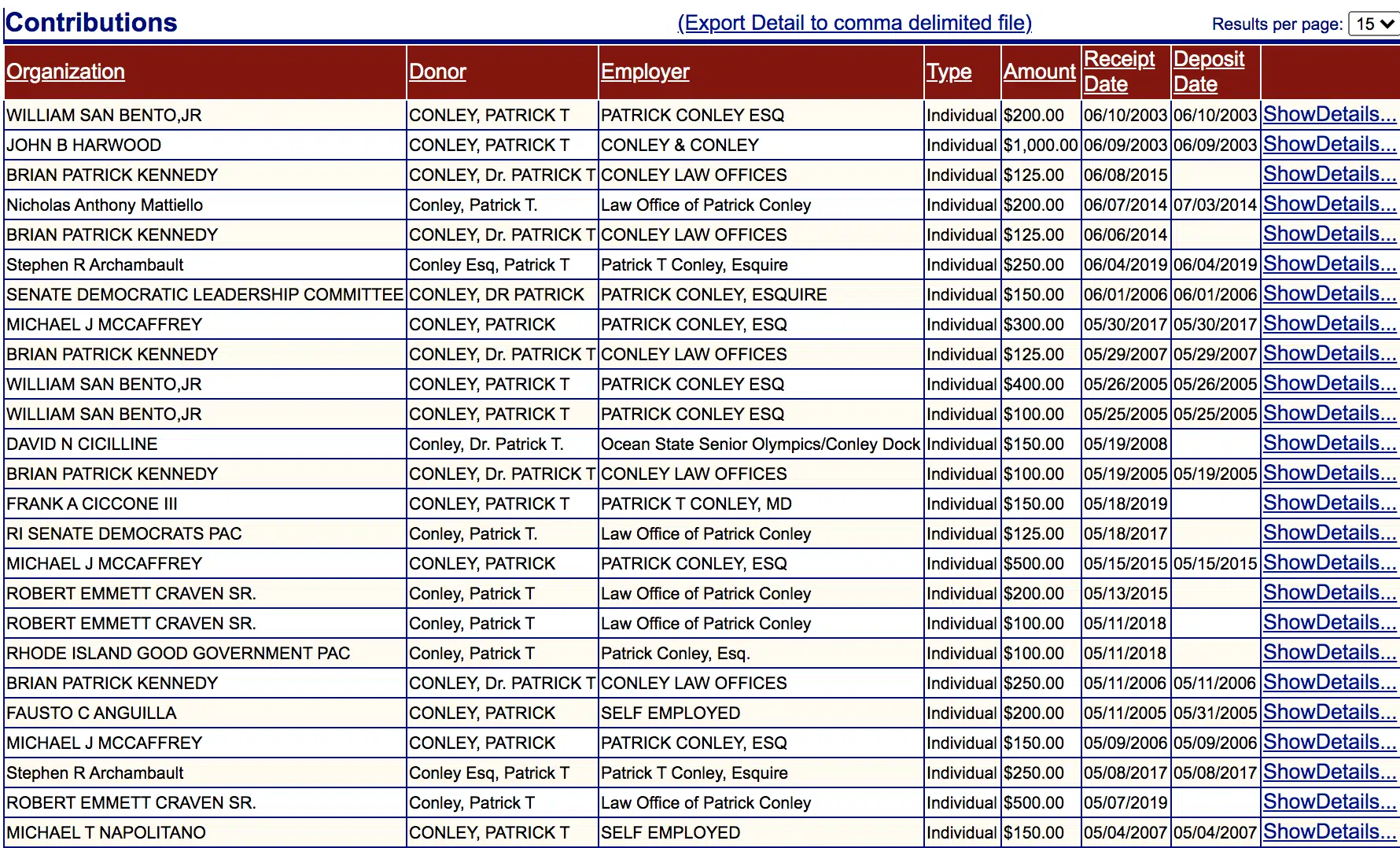Justifying slavery, dismissing new historical insights, disparaging protest are not what we expect from the state's historian laureate
By Phil Eil in Uprise RI
Last October, I wrote a piece for Uprise about Rhode Island “historian laureate” Patrick Conley, and what makes his continued grip on this state-sanctioned title so strange.
In the piece, I pointed out that, while Conley does have solid academic credentials, he’s also got a lot of other baggage.
He worked closely
for disgraced Providence mayor Buddy Cianci. He once spearheaded a failed
“personal quest” to develop Providence’s industrial waterfront into “$300
million mixed-use development.”
He holds, or once held, the distinctions – which he touts on his own website –
of “Providence’s largest, private landowner (in terms of number of parcels
owned)” and “holder of more Rhode Island real estate titles (via tax sale
purchases) than any person in Rhode Island history.”
I also wrote about his history of arguments that seem
out-of-sync not just with Rhode Island’s progressive electorate, but our
current cultural moment of reckoning with the past. To pick just one example:
as protests against police brutality roiled the nation following the death of
George Floyd, Conley wrote about
“The current irrational and hyperbolic political discourse – both right and
left, but especially left.”
And, in addition, I wrote about the troubling circumstances of
Conley’s re-appointment to this position in early 2020. Unlike the first
go-round, there had been no public call for applications this time. The
transaction took place unannounced and behind the scenes, with only a small,
after-the-fact acknowledgement to Public’s Radio reporter
Ian Donnis.
Unfortunately, the things that irked me about Conley last year
have not only persisted – I daresay they’ve gotten worse, and with higher
stakes. Conley remains our “laureate,” and he continues to disseminate his
stale, embarrassing, poorly-argued opinions in our state’s newspapers – always
accompanied by a reminder of his honorary title that conveys the idea he’s
speaking for all Rhode Islanders.
In December he wrote a piece for
the Providence Journal attempting to refute accusations of
racism while also, bafflingly, telling Black folks why they shouldn’t celebrate
Juneteenth on its widely-accepted date.
In August, he penned a letter to The
Independent that was ostensibly about an overlooked Rhode
Island-raised Olympic athlete, but which quickly veered off-subject to a
defense of the Founding Fathers’ slaveholding.
“Some presentistic accounts of American History condemn
Washington, Jefferson, and Madison for slaveholding, while ignoring the fact
that in their time slavery was global and an accepted practice by humans,
whether in America, Africa, or Asia,” he wrote. “These Founders were born and
raised in the slave-ridden culture of Virginia from which they could not
escape.”
Then, this weekend, the Journal ran an op-ed in
which Conley defended Christopher Columbus’s record of slaveholding with that
same rationale: “Such a brutal fate dealt to humans in 1500 shocks us in 2021,
but enslavement of an enemy was common practice at that time in Europe, Asia,
Africa, and among most Native American tribes.”
Defending the slaveholding of prominent historical figures is
apparently a crusade for Conley.
Now, I’m not interested in using this space, and your precious time, to rebut Conley’s points. That would be too easy and obvious. (Although it’s worth pointing out that one of the key points on which he bases his latest flimsy argument – that the Caribs were cannibals, and, thus somehow more deserving of the fate that befell them – has been thoroughly debunked.) Nor am I interested in re-treading too much of the terrain I covered last time.
But I am compelled to revisit the subject of Conley. Because
while I find his views reprehensible, and the means by which he retained this
honorary position disturbing, I am, in a way, grateful he remains so publicly
visible.
Indeed, I’ve come to believe that the fact that we are stuck
with Conley contains lessons that speak louder than any historical wisdom that
he has consciously tried to impart.
It’s worth emphasizing, at the top, that the Pat Conley story
isn’t just about Conley. It’s about the fact that, seemingly whenever he has an
idea, no matter how half-baked or poorly argued, he has a place for it in our
state’s paper of record, The Providence Journal.
At a moment when, according to a recent Columbia
Journalism Review report,
“racial and ethnic minorities comprise almost 40 percent of the US population,
yet they make up less than 17 percent of newsroom staff at print and online
publications, and only 13 percent of newspaper leadership,” Conley represents
the ongoing imbalance of who gets heard in our most widely-read print outlets.
As a longtime reader of, and reporter on,
the Providence Journal, I’m quite confident that if the Journal did
the kind of bold
soul-searching recently undertaken at the New Yorker into
racial inequality in its ranks, it would yield similar, if not even more
troubling results. And each time they publish Conley, they remind us of their
inability to, or apathy about, correcting this lack of diversity on their
opinion pages.
And Conley’s power isn’t just in his access to our most famous
newspaper. Since I wrote about him last fall, the picture of his reappointment
has come into slightly clearer focus. Documents that
I obtained, via an open-records request, show that in a letter to the Secretary
of State following his in-person meeting in February 2020, Conley referred to
his “anticipated re-appointment as Historian Laureate” as if it were a fait
accompli.
Elsewhere in the letter, he noted – quite oddly for a historian
– “My influence with the legislature is not as great as it once was, but it is
still substantial.” Meanwhile, a quick check of the state campaign
finance-track portal shows that
Conley has given more than $30,000 in political contributions in Rhode Island
since the early 2000s. How many of our citizens have the time, access, and
resources, to pull off a similar maneuver?

Partial list of Conley's political donations. The remainder appear at the end of this article. Screen shot from the RI Board of Elections database.
Gorbea, the Secretary of State who OK’d the reappointment, is
now a candidate for
governor. And Gonzalo Cuervo, Gorbea’s former chief of staff who the
APRA-released emails show played a role in brokering a meeting with Conley and
his boss, has declared his candidacy for
mayor of Providence.
Before either candidate proceeds much further in their bids for
two of the state’s highest offices, we deserve an explanation of how this
reappointment happened, and the extent of their involvement.
Conley is symbolic in other ways as well. At a time when the
majority of Congresspeople
are millionaires, and when our Senate is the oldest in
history, he reflects the ways in which our representatives –
be they elected or honorary – are demographically dissimilar from their
constituencies.
At age 83, Conley represents a cohort that is just shy of 18 percent of the population,
and his wealth surely makes him close to, if not a member of, the proverbial
“one percent.” And we know, based on his outspoken opposition to removing
“Plantations” from the state name and the results of the
ballot question on that issue, that he was a member of that minority
position.
He represents, in other words, an exceedingly narrow portion of
Rhode Island’s populace, yet we see his arguments in print time and again.
This, of course, doesn’t mean he shouldn’t ever be published. It just means we
deserve a “laureate” with a little more humility about the limitations of his
personal views and experiences.
And this brings me to the thing about Conley that I find most
bothersome.
You would think that any conscientious “laureate” would
acknowledge the pliability of history, the power dynamics involved in how it is
written, the limitations of his own (white, wealthy, male, politically
connected) perspective, and invite a robust discussion.
But Conley seems utterly uninterested in, or incapable of,
interrogating the ways that his privileges might influence his view of events.
His interest, as illustrated in op-ed after op-ed, seems to lie in stamping out
any attempt, however modest, at historical re-examination.
He will not budge in his views of Columbus or the Founding
Fathers, and he doesn’t believe that we should either. His style does not
invite further debate; he wants to snuff it out. He has written that
“Presentism is History’s cardinal sin” as if this is the only sin a historian
can commit.
At a moment the city of Providence is engaged in a “Truth-Telling,
Reconciliation and Municipal Reparations Process”; when the state’s
lone law school is mandating a
course on race and the law; when the University of Rhode Island
releases a surprisingly strongly-worded
message commemorating Indigenous People’s Day, Conley remains
resolute. He is not rising to meet the moment; he is trying to yell loud enough
to drown it out.
One can expect that, when history is written about our current
our post-George Floyd, post-#MeToo era, it might be dubbed “The Great
Re-Examination.” But this is also a time of backlash.
Fox News, that unrelenting firehose of white grievance, remains
the nation’s most watched
network. State legislatures are passing laws that make it harder
to talk about race
in the classroom and protest
injustice in the streets. Countless politicians and pundits
are building careers out of anti-”woke” posturing and demagoguery. Conley is
our local poster boy for these trends.
A few years ago, I wrote an article about
the influential, yet deeply racist, Rhode Island-born “cosmic horror” author
H.P. Lovecraft. And one of the most memorable quotes came from the legendary
English comics author Alan Moore, who framed Lovecraft’s importance in terms of
the cultural shifts that took place during his lifetime, included advances in
women’s suffrage, leaps in understanding of outer space, the Russian
revolution, new highly visible LGBT communities in American cities, and the
largest wave of migrants and refugees the U.S. had ever seen.
“In this light it is possible to perceive Howard Lovecraft as an
almost unbearably sensitive barometer of American dread,” Moore wrote. “Far
from outlandish eccentricities, the fears that generate Lovecraft’s stories and
opinions were precisely those of the white, middle-class, heterosexual,
Protestant-descended males who were most threatened by the shifting power
relationships and values of the modern world.”
Reading Conley requires less interpretative effort. He writes
nonfiction, not fiction, and there are no aliens or tentacled monsters to
decode. His views are not buried in the subtext; they’re right there on the
surface of the letters and op-eds that he routinely fires off to Rhode Island
newspapers.
But, in Conley, I believe we have a similar barometer of white
male anxiety for our own era. And here lies his value, however ugly and
unintentional.
Conley may not be particularly useful for performing the actual
duties of our historian laureate. His arguments are lazy. His myriad
privileges, conflicts of interest, and decades of political maneuvering go
unmentioned and unexplored.
He seems incurious about developments in his discipline. But as
a rich, old, reactionary white guy with an outsized platform and an influential
position that he maintained through an undemocratic process, he reflects many
of the current political winds in the United States. His grip on this honorary
position, and his frequent cringe worthy op-eds, are an uncomfortable reminder
of how power functions in this country.
Patrick Conley is a terrible historian laureate. But he’s an
excellent reminder of how much work remains to make our little state as just,
compassionate, egalitarian, and genuinely democratic as it deserves to be.


